-
Paper Information
- Paper Submission
-
Journal Information
- About This Journal
- Editorial Board
- Current Issue
- Archive
- Author Guidelines
- Contact Us
Advances in Computing
p-ISSN: 2163-2944 e-ISSN: 2163-2979
2017; 7(3): 63-73
doi:10.5923/j.ac.20170703.01

A Model of a Legal Proceedings Portal for Nigerian High Courts
Moses A. Agana1, Affiku Julius Akolo2
1Department of Maths/Statistics/Computer Science, University of Agriculture Makurdi, Nigeria
2Federal Captal Territory High Court, Abuja, Nigeria
Correspondence to: Affiku Julius Akolo, Federal Captal Territory High Court, Abuja, Nigeria.
| Email: |  |
Copyright © 2017 Scientific & Academic Publishing. All Rights Reserved.
This work is licensed under the Creative Commons Attribution International License (CC BY).
http://creativecommons.org/licenses/by/4.0/

This Study was designed to model a legal proceedings portal for Nigerian High Courts. The purpose is to complement or seamlessly replace the vortex of law reporting books in the legal industry. The platform lays credence to the contributions of the High Courts in Nigeria to the judiciary and public at large. The study was designed using object-oriented technique. The design was implemented using JQuery (A JavaScript library, bootstrap framework, and XAMPP server (Apache, MySQL, PHP and Perl) and was test-run on a local host. The results showed that the portal can provide a platform to access the proceedings of the High Courts in Nigeria and would be a repository for legal research.
Keywords: Legal, Web, Portal, Case, Judgment, Report
Cite this paper: Moses A. Agana, Affiku Julius Akolo, A Model of a Legal Proceedings Portal for Nigerian High Courts, Advances in Computing, Vol. 7 No. 3, 2017, pp. 63-73. doi: 10.5923/j.ac.20170703.01.
Article Outline
1. Introduction
- Laws are laid down by statutes or legislations from parliamentary bodies and judicial decisions by the superior courts of record. Such judicial decisions over time form precedents which are captured in law reports. It was W.T.S Daniel QC in 1863 who proposed the council of law reporting. His proposal contained what a good law report should include and what ought to be excluded. It was clear to him and as it should be clear to us that cases which were valueless as precedents and those which were substantially repetitions of what was reported already ought to be excluded (Bolaji, 2010). While there is no official council for law reporting in Nigeria, a plethora of law reports have emerged over the years to serve the ever growing demands of legal practitioners in Nigeria (Bolaji, 2010).The regular publication of legal opinions is important so that everyone - lawyers, judges, and laymen can all find out what the law is, as declared by judges. The changing system of legal information delivery brought about by the rapid growth of the World Wide Web is overwhelming. The primacy of the old paper sets (printed law reports) is fading, and a vortex of conflicting claims and products is spinning into place. In theory, court decisions posted on the Web expand access to the law beyond the specialized law library collections used primarily by lawyers and judges. The general public can more readily find court opinions online, whether posted on web-accessible databases or through general web search engines (Berring, 1997).Law reports are series of books that contain judicial opinions from a selection of law cases decided by courts. The need for law reporting is derived from the fundamental doctrine of judicial precedent, which is deeply enshrined in Nigeria’s jurisprudence. The need for previous authorities and decisions to be applied by the courts with consistency and certainty to present cases requires that such authorities and decisions be assembled and documented in permanent forms so as to afford easy access and reference by lawyers and judges as well as other users of the law, hence law reports play an undeniably vital role in the administration of justice in Nigeria.A good law Report according to Bolaji (2010) must necessarily include:1. All cases which introduce, or appear to introduce, a new principle or a new rule,2. All cases which materially modify an existing principle or rule,3. All cases which settle, or materially tend to settle, a question upon which the law is doubtful, and4. All cases which for any reason are peculiarly instructive.Furthermore, the reports must be accurate, contain everything material and useful and be concise. In particular, they should show the parties, the nature of the pleadings, the essential facts, the points contended and the grounds on which the Judgment was based as well as the judgment, decree or order actually pronounced. The above remain very essential for good law reporting till this day. Law reporting in Nigeria is as old as the country itself and law reports are critical tools of trade for any lawyer in this country and the cornerstone of any legal practice or academic library. In the fast paced 21st Century, law reporting remains as critical to legal practice as it has ever been and due to the increasingly dynamic nature of legal practice, it is essential that the practice of law reporting is not left behind and is adequately responsive to the needs of the 21st Century lawyer (Tayo, 2015).Tayo (2015) further reported that prior to the publication of law reports in Nigeria on a commercial basis, law reports were being published officially. The officially published law reports began with the Nigeria Law Reports (NLR), which was published by the then Judicial Department from the year 1910 up until 1956, when it was discontinued as a result of the regionalization of the Judiciary in 1954. Other reports include the West African Court of Appeal Reports (WACA), in which decisions of the now defunct West African Court of Appeal were reported, the Federal Supreme Court Reports (FSC) which reported decisions of the Federal Supreme Court between 1956 and 1960 and then the All Nigeria Law Reports (ALL NLR) which was published from the year 1961 up until the seventies. The Judgments of the Supreme Court of Nigeria (SC Reports) was also officially published by the Supreme Court. However the publication of the reports was discontinued at some point in the eighties and later revived. A fact that is unfortunately common to all of these aforementioned officially published law reports is that they are no longer in existence. Apart from the WACA reports, which is no longer required as a result of Nigeria’s independence and departure from the West African Court of Appeal, there is no reasonable justification for the extinction of the other officially published law reports (Tayo, 2015).In terms of the privately and commercially published law reports in Nigeria, the Nigerian Monthly Law Reports (NMLR) is the pioneer law report and was first published in 1964. Between then and now, several law reports have followed, some of which include the Federation of Nigeria Law Reports (FNLR), Supreme Court of Nigeria Judgments (SCNJ), Nigerian Supreme Court Cases (NSCC), Supreme Court Reports (SC), Federation Weekly Law Reports (FWLR), All Federation Weekly Law Reports (All FWLR) and Weekly Reports of Nigeria (WRN). In addition, there are also practice area specific law reports such as the Commercial Law Reports of Nigeria (CLRN), Law Reports of Election Cases in Nigeria (LRECN), Nigerian Criminal Reports (NCR), Banking and Financial Law Reports (BFLR), Nigerian Banking Law Reports (NBLR), Investments and Securities Law Reports, Tax Law Reports of Nigeria (TLRN), Nigerian Constitutional Law Reports (NCLR), Failed Banks Tribunal of Nigeria Law Reports, Sharia Law Reports of Nigeria, Election Petition Reports and Nigerian Labour Law Reports (NLLR) as reported by Tayo (2015).One most basic feature of the 21st Century practice is the computerization of legal research. These days, virtually all types of legal resources are accessible through computers, whether reported cases, statutes or legal commentaries and articles. In essence, in addition to physical libraries which have always been regarded as one hallmark of a good law office, it is becoming important for lawyers and law firms to, in addition, equip themselves with a virtual legal library, a classical example of which is the Law Pavilion Electronic Law Report (Wikipedia, 2016).The development of the Internet has created the opportunity for courts to publish their decisions on websites through third parties. This is a relatively low cost publication method compared to paper and makes court decisions more easily available to the public (particularly important in common law countries where court decisions are major sources of law). These third parties are given permission to post decisions made by the Supreme Court or Court of Appeal on their web sites within the time frame the judgments are rendered, dispensing the need for quickly printed cases in an unofficial, commercial report.This study was designed to avail Nigerian judges, lawyers, and career students to stay abreast with the conduct of High Courts in Nigeria and the decisions of the High Courts on matters before them on the web portal. Law reporting in Nigeria hitherto excludes High Court judgments. Only the Court of Appeal and Supreme Court of Nigeria report their proceedings. This development has undoubtedly undermined the efforts of the High Court as the court of first instance. Worthy of note is the fact that not every case makes it to the Court of Appeal.
2. Challenges of the Nigerian High Courts in Law Reporting
- It appears that in Nigeria as in other Commonwealth jurisdictions, the appellate courts enjoy the attention of the law reports more than courts of first instance. The reason for this is the concept of Judicial Precedent as a doctrine of the English common law. Most cases which are very contentious have a tendency not to end at the court of first instance. Invariably and more often, there is an appeal to the Court of Appeal and ultimately the Supreme Court. It is therefore the decision of the appellate court which becomes judicial precedent. It is the principle of law on which a judicial decision is based. It is also known as the doctrine of stare decisis which literally means "stay by things decided". Precedents abound in the law reports as authorities to follow in determination in courts of justice or a decided case that forms the basis for determining subsequent cases involving similar facts and issues or a decided case that furnishes a basis for determining later cases involving similar facts or issues. For an effective operation of the Doctrine of Judicial Precedent, a settled hierarchy of courts and an efficient system of law reporting are paramount (Bolaji, 2010).Bolaji, (2010) further maintained that there is a growing school of opinion and indeed demand that judgments of first instance, particularly at the High Courts, be it Federal or State are not sufficiently reported. Most cases do not go beyond the High Courts and several important principles are initiated at this level and remain the law, especially when they are not appealed. Where these judgments are not reported, a whole body of legal principles is lost from the aggregation of legal knowledge. Reporting the decision of the High Court is therefore an imperative. Secondly, law reporting serves to highlight the tremendous industry and ingenuity of High Court Judges.
3. Aim and Objectives of the Study
- The aim of this study is to design a legal portal for all the High Courts in Nigeria to serve as a repository for the collection of related judgments where the users can access court proceedings as soon as they are rendered. The objectives of the study are to:i. Design a legal proceedings portal that will host a compilation of all judgments of the High Courts in Nigeria compatible with mobile devices such as iPad or laptops and Personal Computers (PCs).ii. Protect the portal from unauthorized access and from contamination with false proceedings.iii. Implement and document the platform for law cases of the High Courts in Nigeria to be showcased featuring such services as online legal research, court opinions, and regular publication of such opinions.
4. Significance of the Study
- This study is significant to the legal profession because it will provide the latest technology that will go a long way in enhancing the efficiency of legal practitioners and judicial officers in terms of providing fast and easy access to legal reports. It would serve as a tool of trade for legal practitioners by x-raying practice directions and a roadmap for tackling contentious cases and for legal luminaries to take a clue from.The design would also provide a medium for students and the general public to access the contents of the website for information and research purposes free of charge.
5. Scope of the Study
- The study was limited to legal proceedings of High Courts in Nigeria using the Federal Capital Territory High Court, Abuja as a case study. The design covers services such as legal research system, court opinions in searchable online database, and regular publication of such opinions. The study was restricted to developing a single legal proceedings portal that will permit users to access court proceedings as soon as they are rendered but is a simulation of an electronic law reporting portal because it runs on a local host.
6. Methodology
- The existing system was analyzed using the incremental structured systems analysis methodology. Object oriented methodology was adopted in the system design. The design models an electronic law report and research software for use by Judges, Magistrates, Lawyers and Researchers. Court decisions uploaded into the application are collected through the Chief Registrar of the Supreme Court and Court of Appeal upon the approval of the head of Courts. The heads of Court are the Chief Justice of Nigeria and the President of Court of Appeal. It is updated either weekly or monthly depending on the availability of the cases decided from the various Courts (Supreme Court and Court of Appeal). The application is categorized into user privileges such as desktop/laptop users, ipad users, online users and mobile phone users.The application can be loaded by simply clicking on the application icon on the installed device, and all features can then be accessed on the displayed dashboard. But before usage the user has to install, activate the application with the license code and update online. The online legal reporting platform can be used to conduct legal research easier than ever before. It will help legal practitioners to search for authorities on any subject and get results in seconds, rather than the traditional manual search. It is also modelled to contain the latest collection of judgments of the High Courts in Nigeria where new judgments are added within 48 hours of the judgments released with selected laws of the Federation, subsidiary legislations and rules of courts.A study of the existing procedures and the information systems used by the High Court to perform tasks such as assigning cases to various courts, display of court case lists, judgment delivery and the schedule of duties of the court secretary was undertaken to provide information for the system design. The study revealed that the secretary ensures that judgments delivered are typed and presented to the Judge for proof reading and once the document is certified, judgments are made available to counsels or lawyers on behalf of their clients upon request. This means that access to such documents by lawyers or counsels can only be achieved in the court registry. The new system was modeled to offer the following benefits:1. The platform will be free and access can be achieved using a laptop, mobile devices such as iPad, and smart phones.2. Information access by lawyers can be achieved by visiting and downloading documents as required without reaching the court rooms where the matters were determined. 3. No subscription fee is charged and access to information is unrestricted to parties concerned.4. Safe storage of judgment on server against unpredictable circumstances like fire, and computer viral infection.5. Timely upload of court judgments on the web portal.The legal web portal has been modeled to allow interested users to visit the website free (without charge, contrary to commercial sites) and gather information such as judgments from the High Courts as soon as they are concluded in the court rooms. These judgments may be civil or criminal matters as they are adjudicated by the presiding Judge. The presiding Judge having proof read and approved as certified, a copy of the judgment and the verdict of the matter is given, the court secretary uploads the judgment on the legal proceedings web site for public consumption. Each court would have an authorized secretary who would be assigned a user login ID and password to access the court room’s backend from the administrator. The secretary would have the privilege to view all judgments of the court and edit same if there are errors.The user can also check up law quotes and study judgments from various court rooms and Judges’ profiles. The search bar on the web site is used for quick and fast string queries of cases on the user’s subject of interest. All the information are stored in the MySQL database server.The web portal is designed with privileges. It is sectionalized into public, secretary, administrator domains. The secretary and the administrator require login passwords to prevent unauthorized access. The public domain does not require any password to log in, but any attempt to hack into by a user is redirected into the web portal home page. This redirection is achieved by either the administrator or secretary sessions. The portal provides different interfaces for the secretary and the administrator to perform tasks to create, add, update, and view operations.
7. System Implementation
- The application was designed using a blend of programming languages (PHP, HTML and JavaScript) and can run on personal computers and other mobile devices with Internet connectivity. The system was tested with data and values from court proceedings of the Federal Capital Territory High Court Abuja. The application was tested using a local host with the domain name www.highcourts.gov.ng
8. Results
- The results obtained are illustrated in the figures that follow.
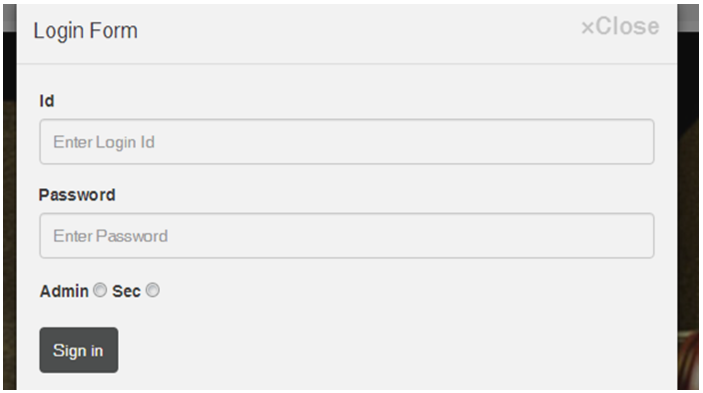 | Figure 1. Login Form screenshot |
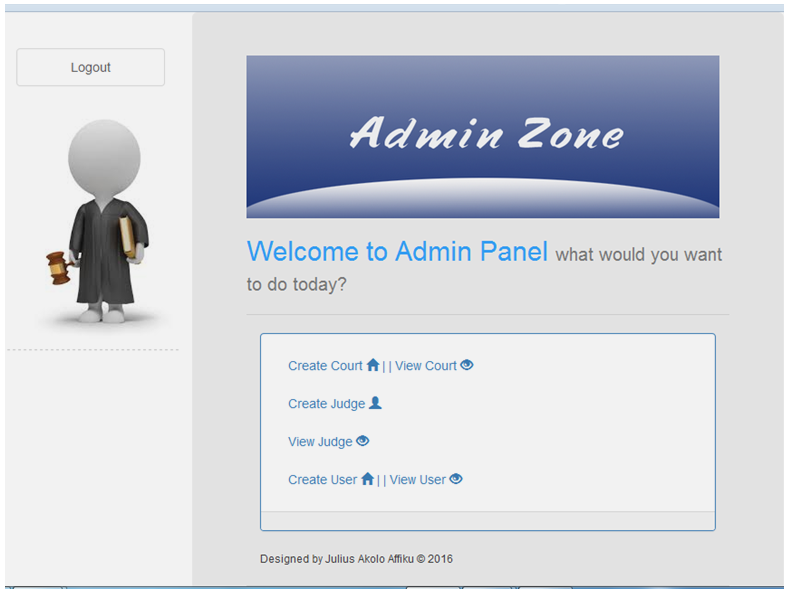 | Figure 2. Admin Panel Form screenshot |
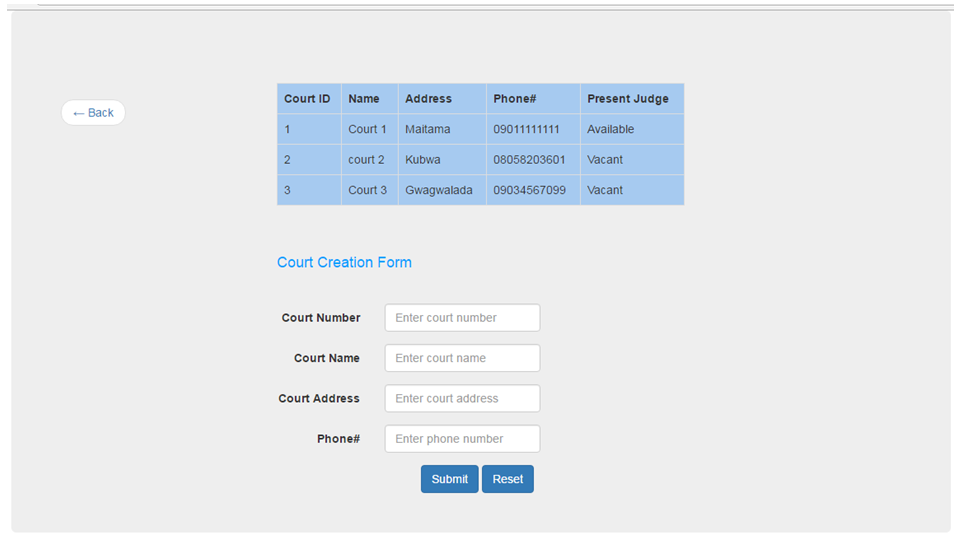 | Figure 3. Admin Panel |
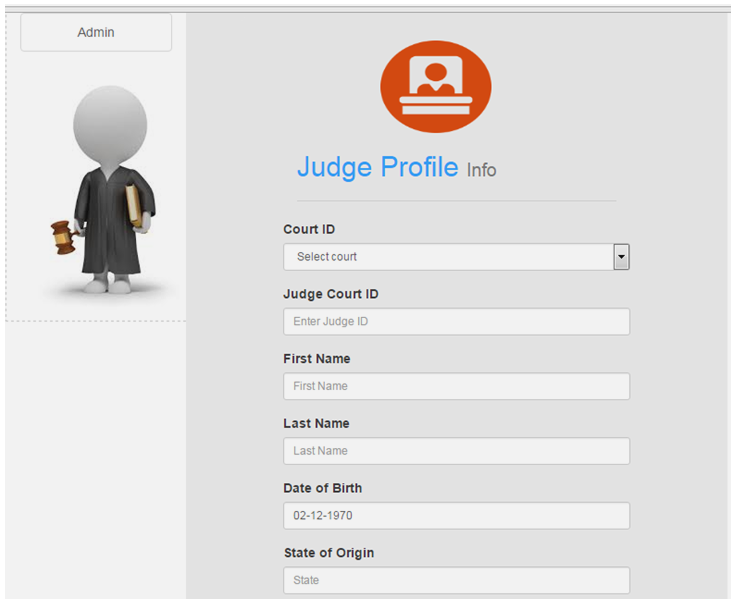 | Figure 4. Admin Panel Form – Judge Creation Screenshot |
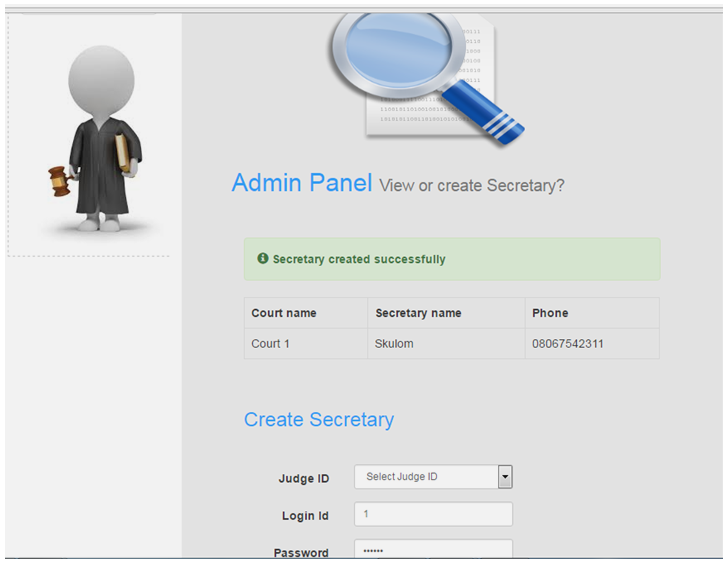 | Figure 5. Admin Panel Form – Secretary Creation screenshot |
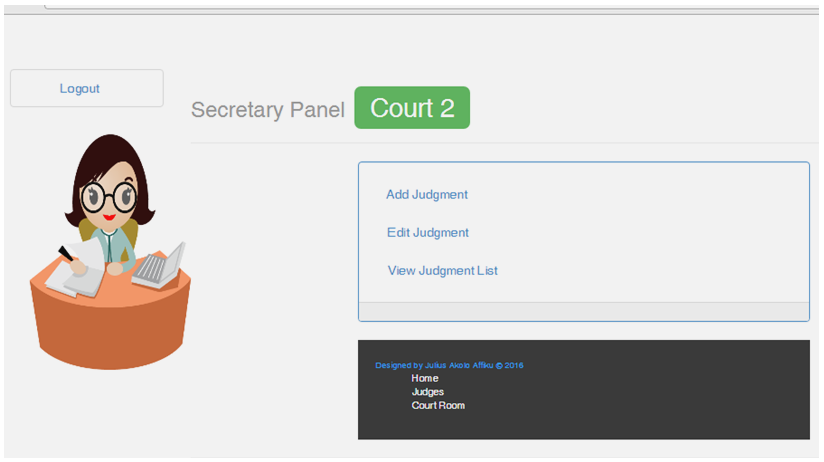 | Figure 6. Screenshot for Secretary Panel |
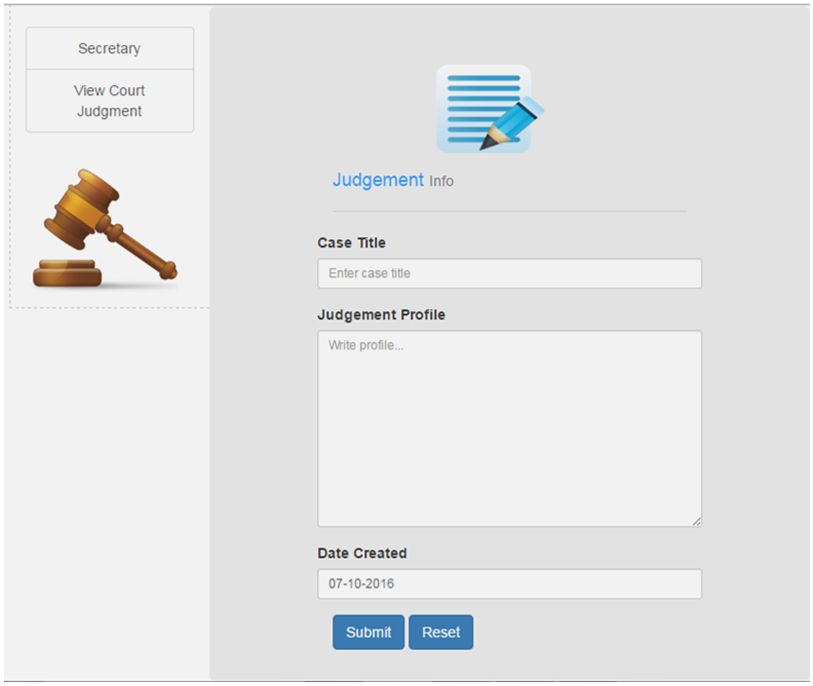 | Figure 7. Screenshot for Secretary Panel – Add Judgment Form |
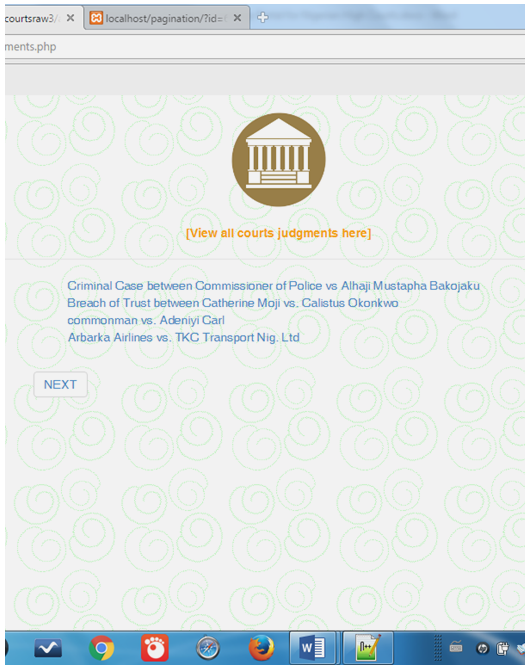 | Figure 8. Screenshot for all Court Judgments View |
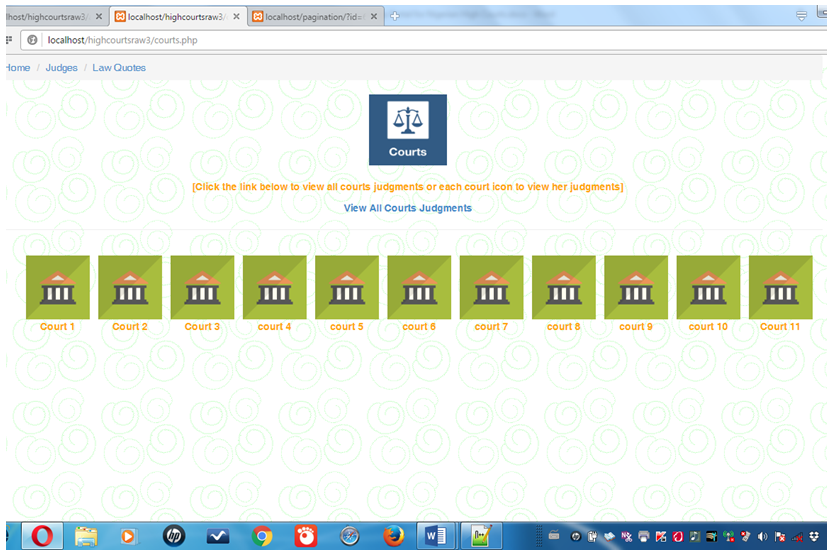 | Figure 9. Screenshot for Judgments per Court View |
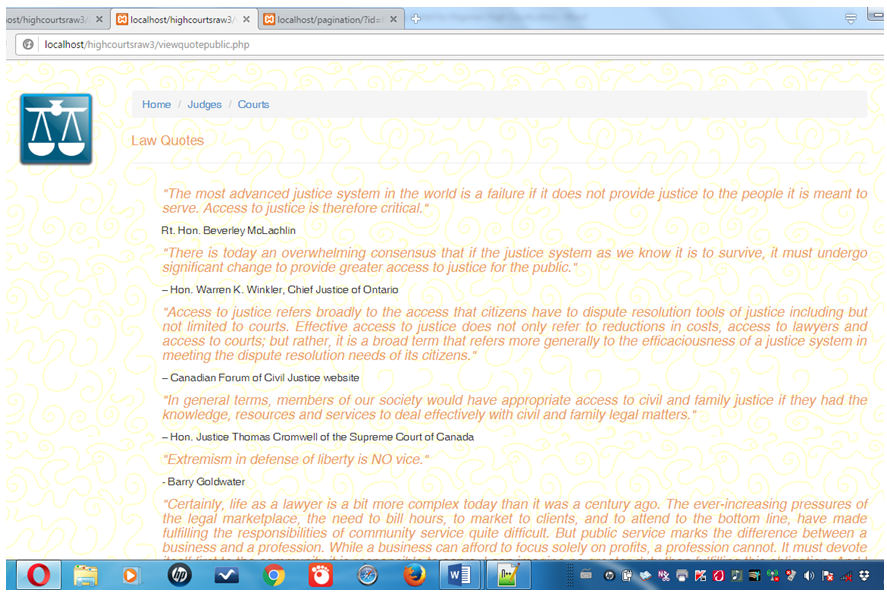 | Figure 10. Screenshot for Law Quotes |
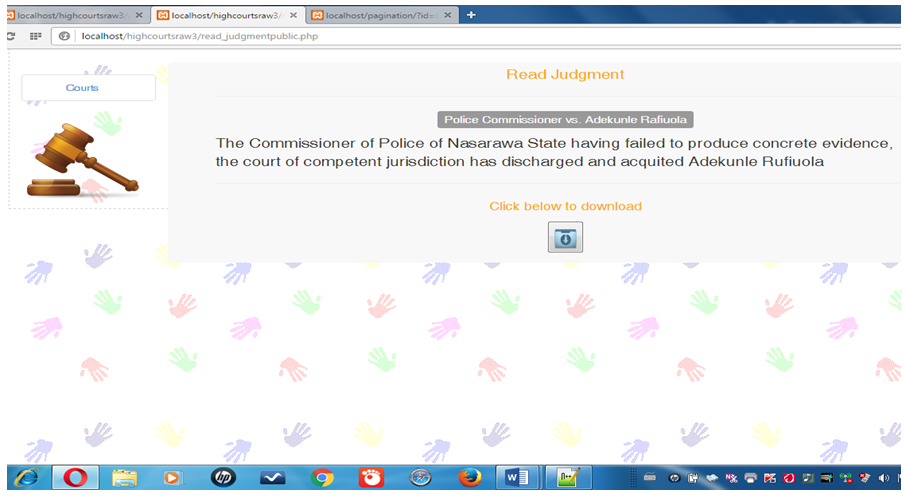 | Figure 11. Screenshot for reading judgments |
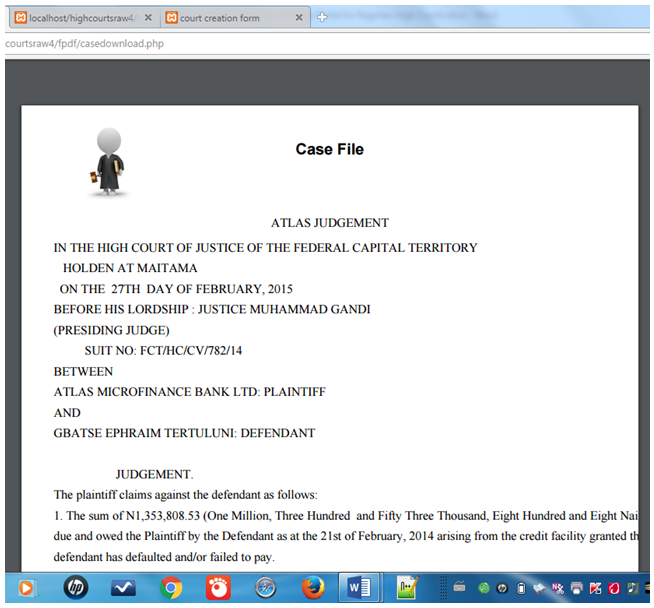 | Figure 12. Screenshot for PDF downloaded file |
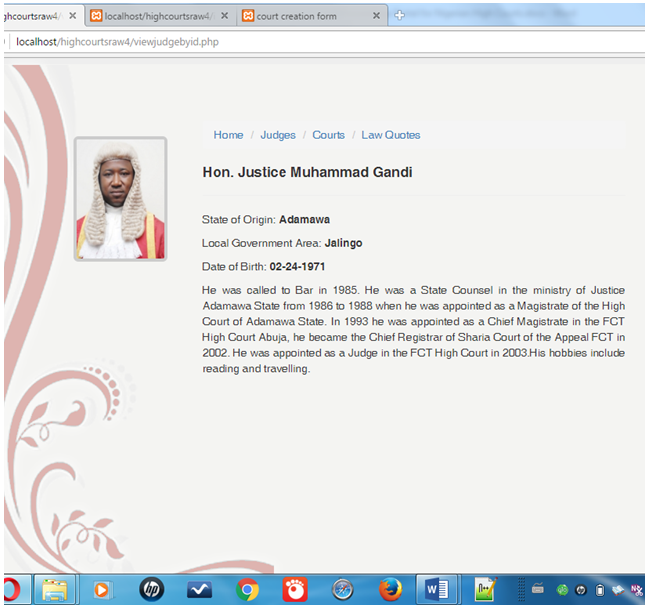 | Figure 13. Screenshot for a Judge’s Profile |
9. Summary
- The legal web portal was designed to provide the public with information on the High Court proceedings in a bid to close the gap between users of legal ideas and those middlemen who are authorized by government to provide such information. The challenge so far has been that access to such information is not possible for the ordinary user, hence this research work has been modeled to provide such access to the proceedings of the High Courts in Nigeria. The legal proceedings web portal if implemented will provide lots of benefits to the legal practitioner, students and legal enthusiasts who are concerned with what goes on in the legal ambience as the site would be accessible to user free of charge via laptops, and mobile devices such as iPad, and smart phones. It would also provide a platform for document download, and a repository for secured storage of legal documents against disasters (fire, flood), malicious attacks such as computer viral infection.
10. Recommendations
- The following are the recommendations made based on this research:i. The outcome of this research is recommended for implementation by the judiciary as it would replace the vortex of papers in the court rooms and mitigate the challenge of overcrowding in the court registry.ii. Government should set up efforts in safeguarding legal documents as it forms the basis for reference and authorities of the court.iii. The site administrator should ensure that the web server is reliable and has less downtime so as to make the web site accessible at all times.iv. The site administrator, as well as, the site secretaries should ensure that their passwords and other login details are not open to hackers or unauthorized persons.v. This application has been designed on a local host and used the FCT High Court of Justice, Abuja as a case study hence has left room for further expansion such as deployment on the world wide web (www).
 Abstract
Abstract Reference
Reference Full-Text PDF
Full-Text PDF Full-text HTML
Full-text HTML